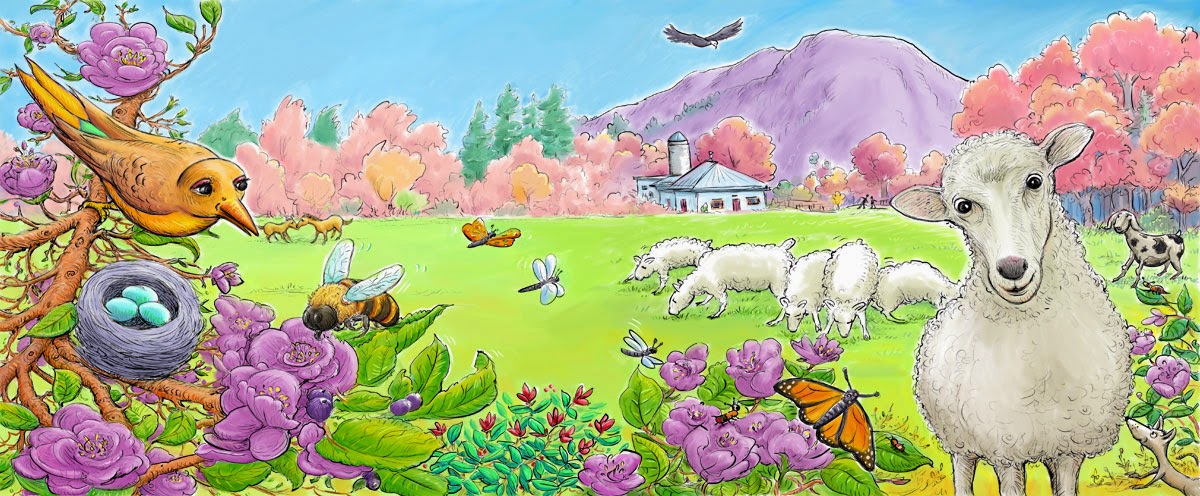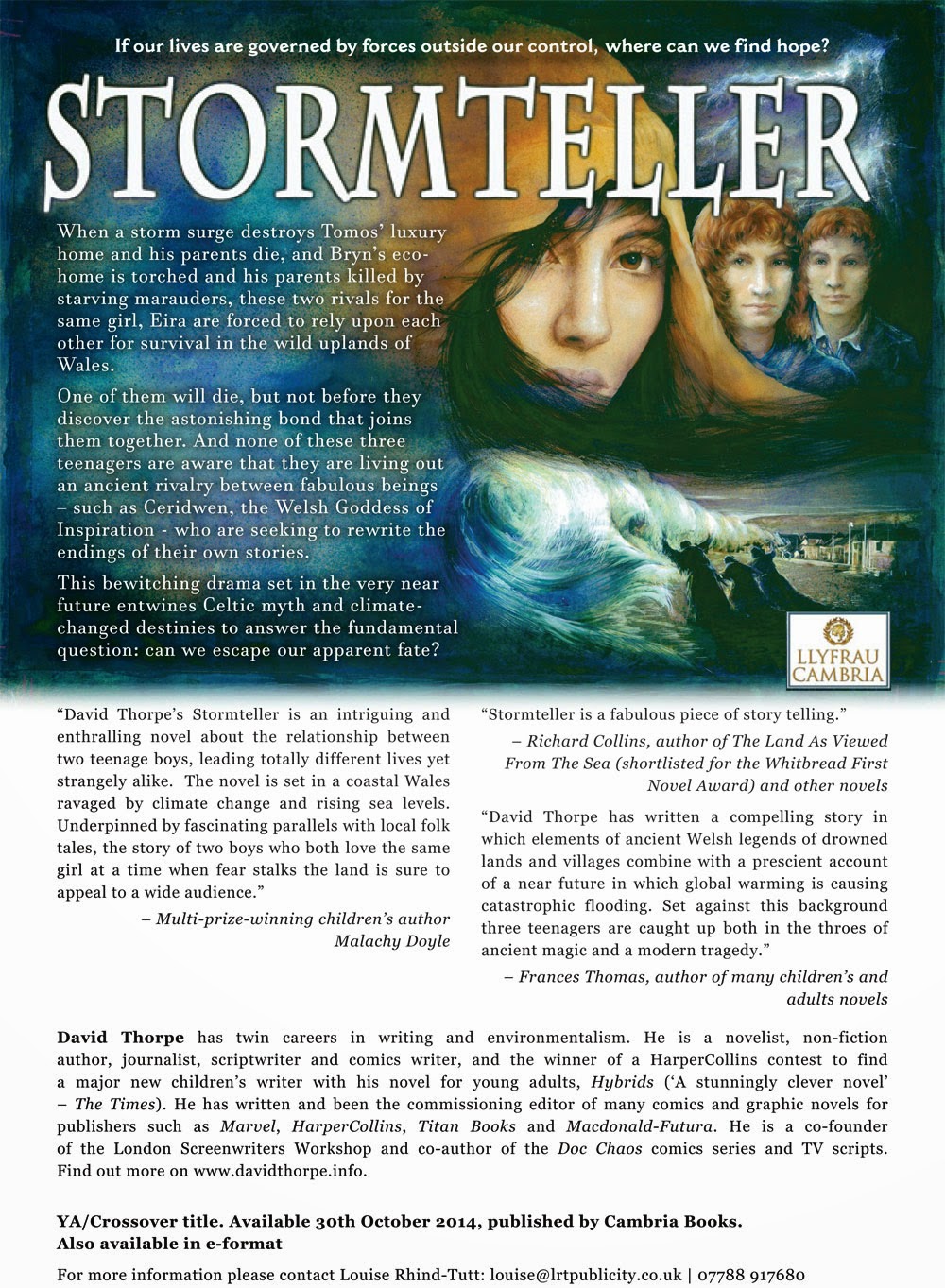new posts in all blogs
Viewing: Blog Posts Tagged with: climate change, Most Recent at Top [Help]
Results 26 - 50 of 97
How to use this Page
You are viewing the most recent posts tagged with the words: climate change in the JacketFlap blog reader. What is a tag? Think of a tag as a keyword or category label. Tags can both help you find posts on JacketFlap.com as well as provide an easy way for you to "remember" and classify posts for later recall. Try adding a tag yourself by clicking "Add a tag" below a post's header. Scroll down through the list of Recent Posts in the left column and click on a post title that sounds interesting. You can view all posts from a specific blog by clicking the Blog name in the right column, or you can click a 'More Posts from this Blog' link in any individual post.

By: Clare Hanson,
on 11/20/2015
Blog:
OUPblog
(
Login to Add to MyJacketFlap)
JacketFlap tags:
UK,
europe,
renewable energy,
European Union,
carbon emissions,
Social Sciences,
*Featured,
Business & Economics,
Europe's Long Energy Journey,
Malcolm Keay,
renewable sources,
single market,
Towards an Energy Union?,
Books,
David Buchan,
decarbonisation,
energy markets,
Energy security,
Energy Union,
environment,
climate change,
Add a tag
Is Europe heading towards an Energy Union -- the ambitious goal announced by the Commission at the beginning of this year? If so, many would say that it is about time. Energy has long been neglected by Europe.
The post Obstacles on the road to a European Energy Union appeared first on OUPblog.
I’ve been avoiding Naomi Klein’s This Changes Everything. Because the only thing that makes climate change-themed book harder to read than its already difficultly depressing subject matter is a climate change-themed book that’s the thickness of a brick. Seriously, Klein has written War & Peace. Coupled with the fact that her writing is fairly dense […]

By: Clare Hanson,
on 10/15/2015
Blog:
OUPblog
(
Login to Add to MyJacketFlap)
JacketFlap tags:
conflict,
Books,
Politics,
government,
climate change,
Syria,
Social Sciences,
*Featured,
Bashar al-Assad,
ISIL,
anthropogenic,
Human Migration,
Large-scale migration,
Root Causes,
Syrian Refugee Crisis,
Add a tag
What should we make of Chancellor George Osborne’s recent claim that we need a “comprehensive plan” to address the burgeoning Syrian refugee crisis, a plan that addresses the “root causes” of this tragic upheaval? The UK government’s way of framing the issue is not unique. Many other governments as well as political pundits of various ideological stripes have been urging us to see the issue in precisely these terms.
The post Climate change and the Syrian refugee crisis: being honest about root causes appeared first on OUPblog.
A polar bear cameo in this week's
Harts Pass. To understand why, read the post below... GRRR!

By: Kathleen Sargeant,
on 8/22/2015
Blog:
OUPblog
(
Login to Add to MyJacketFlap)
JacketFlap tags:
climate adaptation law,
climate change law,
climate change litigation,
climate change mitigation,
J.B. Ruhl,
Law,
Journals,
climate change,
*Featured,
oxford journals,
legal system,
environmental law,
Journal of Environmental Law,
Add a tag
Some years ago Dave Markell and I noticed that commentary on climate change law was devoting a tremendous amount of attention to a small handful of judicial opinions as being representative of trends in climate change litigation, whereas inventories of climate change litigation, such as the Columbia Law School’s Sabin Center blog, included hundreds of active and resolved cases.
The post What is climate change law? appeared first on OUPblog.

By: JulieF,
on 8/13/2015
Blog:
OUPblog
(
Login to Add to MyJacketFlap)
JacketFlap tags:
Books,
biology,
climate change,
vaccination,
*Featured,
causation,
Science & Medicine,
herd immunity,
Earth & Life Sciences,
Ecological Society of America,
Stephen H. Jenkins,
Tools for Critical Thinking in Biology,
human thinking,
single cause versus multiple causes,
Add a tag
Imagine the thrill of discovering a new species of frog in a remote part of the Amazon. Scientists are motivated by the opportunity to make new discoveries like this, but also by a desire to understand how things work. It’s one thing to describe the communities of microorganisms in our guts, but quite another to learn what causes these communities to change and how these changes influence health.
The post Complexities of causation appeared first on OUPblog.
There are stories in the news all the time about climate change these days. the most recent one, in case you missed it, is how sea levels will likely rise more and faster than previously thought. If you are considering buying beachfront property you might want to rethink that.
But while these stories are shocking and worrisome, for the most part people go on their merry way because they don’t live on the coast or in drought burdened California or any other “threatened” place. Not in my backyard, not my problem. Except it is. If we think the migrant issues in the Mediterranean are bad now, it is only going to get worse. But worse still is so abstract it is hard to imagine. That’s where writers like Margaret Atwood can help.
In 2009 she wrote a piece on climate change for the German newspaper Die Zeit. Now, Atwood has updated the article and the online magazine Matter has reprinted it as It’s Not Climate Change it’s Everything Change. In the article Atwood imagines three possible scenarios, a utopian one, a worst-case one, and a somewhere in between one. They are nothing more than short sketches but it is very easy for the imagination to fill in the details of what if.
And while I would love to be able to go down the road of the utopian scenario, realistically, it is too late for that one to happen. So we are looking at the possibility of worst-case or something short of that. But if anyone thinks the not worst possible outcome scenario is not that bad, you’re wrong. And if you think that daily life as we know it will be pretty much the same in twenty or thirty years, you’re wrong about that too.
The essay isn’t a huge downer though, in typical Atwood fashion, she injects some dark humor into it:
The present governor of Florida, Rick Scott, is said to have issued a memo to all government of Florida employees forbidding them to use the terms “climate change” and “global warming,” because he doesn’t believe in them (though Scott has denied this to the press). I myself would like to disbelieve in gravitational forces, because then I could fly, and also in viruses, because then I would never get colds. Makes sense: you can’t see viruses or gravity, and seeing is believing, and when you’ve got your head stuck in the sand you can’t see a thing, right?
Oh, she is so good!
What Atwood’s essay drives home most, however, is that no matter what future scenario comes to pass, everything is going to change. It will be changing in our lifetime. It will happen whether we want it to or not.
Filed under:
Margaret Atwood Tagged:
climate change 


By: Hannah Paget,
on 7/20/2015
Blog:
OUPblog
(
Login to Add to MyJacketFlap)
JacketFlap tags:
Arts & Humanities,
hedonic normalization,
K. Eric Drexler,
Nicholas Agar,
Peter Diamandis,
radical optimist,
Sceptical Optimist,
Techno-optimist,
technological progress,
Books,
Sociology,
Technology,
star trek,
Philosophy,
happiness,
climate change,
nuclear weapons,
Editor's Picks,
*Featured,
Science & Medicine,
well being,
Add a tag
Today there are high hopes for technological progress. Techno-optimists expect massive benefits for humankind from the invention of new technologies. Peter Diamandis is the founder of the X-prize foundation whose purpose is to arrange competitions for breakthrough inventions.
The post Why a technologically enhanced future will be less good than we think appeared first on OUPblog.

By: JulieF,
on 6/28/2015
Blog:
OUPblog
(
Login to Add to MyJacketFlap)
JacketFlap tags:
climate change,
Social Sciences,
*Featured,
Science & Medicine,
Earth & Life Sciences,
climate change policy,
climate change politics,
climate change science,
Environmental Politics,
environmental sustainability,
global warming policy,
global warming politics,
global warming science,
Stephen H. Jenkins,
Tools for Critical Thinking in Biology,
Books,
Politics,
global warming,
Add a tag
With more candidates entering the 2016 presidential race weekly, how do we decide which one deserves our vote? Is a good sense of humor important? Should she be someone we can imagine drinking beer with? Does he share our position on an issue that trumps all others in our minds? We use myriad criteria to make voting decisions, but one of the most important for me is whether the candidate carefully considers all the evidence bearing on the positions he advocates.
The post When politicians talk science appeared first on OUPblog.

By: KatherineS,
on 6/26/2015
Blog:
OUPblog
(
Login to Add to MyJacketFlap)
JacketFlap tags:
weather,
nature,
science,
Geography,
future,
global,
tsunami,
VSI,
climate change,
earthquakes,
Very Short Introductions,
geology,
natural disaster,
natural disasters,
volcanoes,
Editor's Picks,
*Featured,
Science & Medicine,
Bill McGuire,
Earth & Life Sciences,
Global Catastrophes,
VSI online,
Global Catastrophes: A Very Short Introduction,
Add a tag
If you like your prophecies pin sharp then look away now. The 16th century celebrity seer Nostradamus excelled at the exact opposite, couching his predictions in terms so vague as to be largely meaningless. This has not, however, prevented his soothsayings attracting enormous and unending interest, and his book – Les Propheties – has rarely been out of print since it was first published 460 years ago. Uniquely, for a renaissance augur, the writings of Nostradamus are perhaps as popular today as they were four and a half centuries ago.
The post Look away now: The prophecies of Nostradamus appeared first on OUPblog.

By: Alice,
on 6/22/2015
Blog:
OUPblog
(
Login to Add to MyJacketFlap)
JacketFlap tags:
Law,
Journals,
climate change,
*Featured,
oxford journals,
JEL,
Journal of Environmental Law,
David D. Caron,
international law of baselines,
negative legal feedback,
ocean boundaries,
self-adapting law,
US common law,
Add a tag
How would law look different if we had always known about climate change? One difference - I would suggest - is that it would have been constructed so as to self-adapt to the changing context that it seeks to govern. What does it mean to self-adapt? An example of self-adapting law can be found in long term supply agreements.
The post Climate change and self-adapting law appeared first on OUPblog.
National Geographic writer Joel K Bourne Jr studied something MEGO—short for ‘my eyes glaze over—at university. For agronomy, a combination of soil and plant science, doesn’t exactly inspire intrigue. Or even understanding of what it is for that matter. (I’ll confess I had no idea what an agronomist was prior to reading this book—I’d have […]
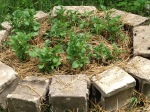
Happy potatoes
The week gave the garden some good rain and some good sun. Everything is green, green, green and the weeds are growing like, well weeds. It is impossible to keep up with them. Even when we mulch they still manage to find places where the mulch is thin and then they spread from there. Sigh.
The good news is that the replanting of the polyculture bed was a success. The radishes are coming up like crazy, the beets are poking up too and couple beans are just pushing up. I was talking with a gardening friend the other day and she said she had to replant her beets and lettuce too because nothing had come up. I feel a little better now because I can say it was nothing I did wrong. Neither of us was able to speculate why our first seeding did not take, but it’s working now so I’m happy. If only I can get rid of the two rabbits we keep having to chase out of the garden. They have eaten almost all of the sunflowers and they left one of the sweet potato plants with only one leaf. Since the other two plants still have all their leaves, I am assuming they are not tasty. I hope the singled leafed one is not doomed to die.
Speaking of potatoes, the regular potatoes are doing amazing. We mounded up dirt and are now using straw because we don’t have any more dirt. That’s fine, it will be easier to get to the potatoes with the straw than with the dirt. At least that’s what the literature says.
Two years ago we planted a white peony. I didn’t expect the little thing to bloom the first year. Last year it

white peony
grew into a stumpy shin-high plant that didn’t flower and didn’t look like it was ever going to do anything at all. This year, it has come back big and strong and has given us some pretty bright white flowers with the faintest smudge of creamy yellow in the middle. We got to enjoy them for two days and then it poured rain on them last night and flattened them. Peonies and rain never go together. But the climbing rose is starting to bloom and is doing as well as ever.
Does anyone know what to do with winter savory? I planted some in the herb spiral last year. It is a pretty
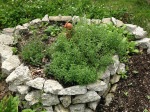
winter savory gone wild
perennial herb, and this year it is going crazy. But Bookman has never had a recipe that calls for the herb and we are at a loss as to what exactly to do with it. Any suggestions are welcome! Remember though, we’re vegan so don’t tell me it tastes good on beef or fish, etc. that does me no good.
Because the city is discontinuing the program that provides free wood chips, Bookman and I have been struggling to decide what to do about the wood chip paths through the garden. They have reached the point where the chips need to be replenished. We tried to get a chip delivery from tree companies last year but no one had any which struck me as odd but whatever. I refuse to buy bagged mulch, I don’t trust where it comes from. At least with local chips I know they come from trees the city trimmed or had to remove. I don’t want to buy bagged mulch
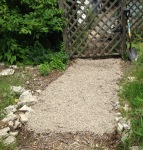
changing wood chips to gravel
that might be from trees that were cut down for the express purpose. So we decided to put down gravel at least on the main garden path. Those bags are heavy! Since we have only a small car we can only do a few bags at a time but we made a pretty good start.
Our poor corn field. We planted quite a lot of popcorn this year instead of sweet corn and it was coming up great. We removed the row cover fabric last week when most of the plants were a couple inches tall. During the week the wascally rabbits have thinned the field. We still have ten plants but when it was double that you can see why I might be disappointed. Today I planted pole beans by each of the cornstalks and a few extra in one empty corner where we will make a twig teepee for them to climb up. I also planted pie pumpkins and because the bed is bigger than last year I planted even more vines, about 12 seeds in all. If they all germinate the garden in fall will be buried under pumpkin vines. And if each vine produces 2 pumpkins, well you do the orange math. I love pumpkin however, and if I really end up with 12-24 of them I will try making my own pumpkin butter. Have you ever had it? It is so gosh darn heavenly delicious.
The Royal Horticulture Society in Great Britain has been doing some fab work on gardening and climate change. They have a website with helpful information for gardeners and they recently produced a report on climate change and urban gardening. Did you know that just a 10% increase in planting urban areas will help keep cities cooler? Urban gardens also assist with flood control and they help support wildlife. And of course, gardening is good for people too providing stress relief and exercise. Spend an afternoon lifting bags of dirt, cinder blocks and bags of pea gravel and there is no need to go to the gym! Plus, being outdoors you get vitamin D and a big dose of vitamin N(ature), two things the gym definitely can’t offer.
The week ahead looks to be warm, approaching hot, and dry. Good thing the rain barrels are full!
Biking
Yesterday Astrid and I managed to ride 54.2 miles/87km! My longest distance yet. It is a good thing Bookman and I went to the bike shop on Friday afternoon where I got a second water bottle and cage. I also got some snazzy gloves with gel in key places and for the first time my hands weren’t tingling and numb when I was done with my ride. Win! I also got a little under the seat bag to hold my patch kit and what-not. Now the only things I carry in my pockets are what I most want access to, my lip balm and my snacks!

You shall not pass
I rode out along a regional trail I had not been on before. Once again it took a hop across the street and I missed the signage, went left when I should have gone right and took a tour of the suburbs and the astonishingly large mcmansions and expanses of green lawn. It was completely cringe worthy. The people who were out were nice to me though, saying hi as I rode by.
Eventually, my map and I found our way back to the trail only to run up against a closed sign five minutes later. Apparently with some recent rains there was a mudslide and trail washout. Sigh. So I turned around and got to see the part of the trail I had missed before due to my wrong turn. And then I got to another part of the trail where I couldn’t tell which way it was supposed to go. After much backing and forthing I finally figured out which branch I was supposed to take. The rest of the ride was fairly uneventful.
One part of my ride took me along the Mississippi River a portion of which runs north of downtown Minneapolis.

St Anthony Falls
Minneapolis was founded was a flour milling town and back in the days of the mills, they built an artificial waterfall in the river to power them. The mills are gone now and one that remains has been turned into a pretty fantastic museum. The falls are still there as is a lock and dam system that was created to get the river traffic past the falls. The falls are called St. Anthony. I snapped a photo to give you an idea of what it looks like. you can see part of the falls in the background and in the foreground is part of the lock. There is a lookout park there that was super crowded so I didn’t try to ride in for a better view and photo. Behind me is the old flour mill that is now a museum. Part of the bike trail runs across what was once an old wooden road next to the mill. It’s a bumpy ride, but it is also kind of fun riding over and by a piece of history.
In some recent internet clicking, I came across a website called Velominati. It is pretty hardcore cycling and fairly male-centric but what was amusing was the long page of ”rules” that cover important things like tan lines, the allowed matching options for saddle, bars and tires, how to properly hang your helmet on your bike, those kinds of things. One of my favorites though is rule 38, Don’t play leap frog:
Train Properly: if you get passed by someone, it is nothing personal, just accept that on the day/effort/ride they were stronger than you. If you can’t deal, work harder. But don’t go playing leap frog to get in front only to be taken over again (multiple times) because you can’t keep up the pace. Especially don’t do this just because the person overtaking you is a woman. Seriously. Get over it.
Yes!
There were lots of women out riding yesterday which made me so very happy. And I even got a compliment from one of them. I was moving at a pretty good pace and a woman came alongside and as she passed she said, I’ve been trying to catch you for a very long time! You’re doing great! Squee! Best bike compliment ever.
Filed under:
biking,
gardening Tagged:
climate change,
Mcmansion tour,
Nothing like a compliment,
stupid rabbits,
what the heck do you do with winter savory? 


By: Sinead O’Connor,
on 5/31/2015
Blog:
OUPblog
(
Login to Add to MyJacketFlap)
JacketFlap tags:
climate change,
Corporations,
consumption,
Food Politics,
What Everyone Needs To Know,
Robert Paarlberg,
US politics,
Social Sciences,
*Featured,
Business & Economics,
libertarian,
Gluttony and the Dark Side of American Exceptionalism,
The United States of Excess,
Books,
Politics,
obesity,
Add a tag
It is easy enough for critics to trace America’s over-consumption of things like food and fuel to the excess power of our profit-making corporations. Americans consume more food and fuel than Europeans in part because these companies in America are better able to resist taxes and regulations.
The post Over-consumption in America: beyond corporate power appeared first on OUPblog.

By: Kathleen Sargeant,
on 5/22/2015
Blog:
OUPblog
(
Login to Add to MyJacketFlap)
JacketFlap tags:
Law,
Journals,
climate change,
*Featured,
oxford journals,
environmental law,
Journal of Environmental Law,
Kim Bouwer,
legal practice,
Add a tag
Thinking about climate change generates helplessness in us. Our persistent role creating this global catastrophe seems so inevitable as to be predetermined; our will to contain it, or even reach agreement to contain it, feeble.
The post Climate consciousness in daily legal practice appeared first on OUPblog.
I love reading nonfiction but it tends to be much more dangerous than fiction because it adds so many books to my TBR list. Sure, fiction can add books but for me it tends to be a slow burn. Nonfiction on the other hand provides lists as part of the book, bibliographies, further reading, footnotes, endnotes, these cannot be escaped unless you refuse to look at them. If you can, you have more willpower than I do!
After I finished reading This Changes Everything I combed the endnotes in which I had already placed a few markers due to mentions in the text. I thought I’d share the list of things I gleaned from the endnotes that some of you might also find interesting.
- Engaging with Climate Change by Sally Weintrobe, ed. Takes a psychoanalytic perspective in exploring what climate change means to people.
- The Republican Brain: The Science of Why They Deny Science — and Reality by Chris Mooney. From the book description: “Science writer Chris Mooney explores brain scans, polls, and psychology experiments to explain why conservatives today believe more wrong things; appear more likely than Democrats to oppose new ideas and less likely to change their beliefs in the face of new facts; and sometimes respond to compelling evidence by doubling down on their current beliefs.”
- Tropic of Chaos: Climate Change and the New Geography of Violence by Christian Parenti. Examines the unrest and violence caused by extreme weather and discusses how sustainable living could solve a lot of problems.
- Solving the Climate Crisis Through Social Change by Gar Lipow. Argues that climate change is a side effect of inequality and injustice and suggests that if we solve those problems we will go a long way toward solving the climate change problem too.
- Any Way You Slice It: The Past, Present, and Future of Rationing by Stan Cox. An examination of how we share our planet’s resources that ultimately asks, “can we limit consumption while assuring everyone a fair share?”
- The Bridge at the End of the World: Capitalism, the Environment, and Crossing from Crisis to Sustainability by James Gustave Speth. The “environmental community has grown in strength and sophistication, but the environment has continued to decline.” So what’s up with that?
- Think Like a Commoner: A Short Introduction to the Life of the Commons by David Bollier. Examines the idea and history of the commons and argues that a return to a commons mindset and way of life will inspire fairness and cooperation.
- Ecology and Power: Struggles Over Land and Material Resources in the Past, Present, and Future by Alf Hornborg. Informed by the notion of political ecology, the book examines the roles of power and inequalities in shaping land use and resource management.
- Climate Change and the Media by Tammy Boyce and Justin Lewis. Addresses the role of the media in our understanding of climate change
- Hack the Planet: Science’s Best Hope — or Worst Nightmare — for Averting Climate Catastrophe by Eli Kintisch. Examines a variety of ideas for technological and geoengineering fixes for climate change.
- The Way of Ignorance and Other Essays by Wendell Berry. Essays on a variety of topics “motivated by fear of our violence to one another and to the world, and my hope that we might do better.”
- Slow Violence and the Environmentalism of the Poor by Rob Nixon. Examines the slow violence caused by climate change, oil spills, toxic drift, deforestation and the environmental aftermath of war.
- The God Species: How the Planet Can Survive the Age of Humans by Mark Lynas. Looks at ways we can save the planet from ourselves.
- Consulting the Genius of the Place: An Ecological Approach to a New Agriculture by Wes Jackson. Discusses our food systems and the changes that need to be made in how food is grown and sold.
- Living in Denial: Climate Change, Emotions, and Everyday Life by Kari Marie Norgaard. Examines why people who know about climate change fail to take action.
- It All Turns on Affection The 2012 Jefferson Lecture by Wendell Berry that you can read online. Discusses how love of place can make all the difference.
Who knows if I will ever come close to reading all of these but they all look pretty interesting!
Filed under:
Book Lists,
Books Tagged:
climate change 

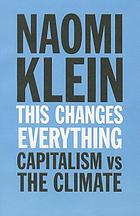 Climate change is happening right now and it is only going to get worse unless we take drastic steps immediately. Yesterday was the bad news portion of Naomi Klein’s This Changes Everything. Today is the small ray of hope.
Climate change is happening right now and it is only going to get worse unless we take drastic steps immediately. Yesterday was the bad news portion of Naomi Klein’s This Changes Everything. Today is the small ray of hope.
It is entirely possible to make the switch to 100% renewable energy for the entire world by as early as 2030. We have the technology to do this, what is lacking is the will and the money. The free market as it currently functions will not get us there nor will our politicians. What needs to happen, Klein says is a mass social movement. She believes it is the only thing that will save us now. There are precedents, remember the Arab Spring? The US Civil Rights Movement? The Women’s Movement? Granted, none of these brought about a complete revolution, but they made an impact and perhaps a world-wide social movement could take hold and save us all.
There are places where it is already beginning. Klein calls the movement “Blockadia.” Currently much of it exists in areas where people are trying to protect land from being fracked. In the United States and Canada there are arising coalitions between indigenous peoples and their traditional opposition: ranchers, hunters, large farming operations. There is also a growing movement begun in Totnes, UK called Transition Town. It is a community led project to build resilient, sustainable communities.
Then there is the divestment movement that seems to be growing rapidly especially among universities. Divestment is about large institutions getting rid of their investments in fossil fuels. Yes, someone else buys the shares when they are sold, however, the more places that divest, the more public awareness it gets, the more unacceptable it becomes to make money from fossil fuels.
The bad news is there is nothing we can do alone that will make a difference. The good news is that together we can make change happen. Klein understands the difficulty in this:
For most of us living in postindustrial societies, when we see the crackling black-and-white footage of general strikes in the 1930s, victory gardens in the 1940s, and Freedom Rides in the 1960s, we simply cannot imagine being part of any mobilization of that depth and scale. That kind of thing was fine for them but surely not us — with our eyes glued to smart phones, attention spans scattered by click bait, loyalties split by the burdens of debt and insecurities of contract work. Where would we organize? Who would we trust enough to lead us? Who, moreover, is ‘we’?
The key to it all is a change of mindset. We much let go of our extractivist thinking that allows us to believe we can take and take and take, that we can control and dominate nature. There must, as Klein says, be a “fundamental shift in power relations between humanity and the natural world.” We must give up taking and dominating and become caretakers focused on renewal and regeneration.
It won’t be easy, if it were, we would have changed our ways already. But it isn’t impossible and we shouldn’t give up. One of the great things about a mass movement is when you start to feel overwhelmed and like your work isn’t making a difference, you are surrounded by people who can help bolster and renew your spirit. So find a local group already active in your area, or if there isn’t one, start one. Talk to your neighbors, your friends, they probably feel the same way you do and are just waiting for someone to light the fire. You could be the spark that gets it going.
Filed under:
Books,
Nonfiction,
Reviews Tagged:
climate change 

Naomi Klein’s This Changes Everything was a seriously depressing book for me. It took a long time to get through because I could not bear to read more than twenty or so pages at a time. The book can be more or less broken up into two parts, the bad news and there is still a chance to do something news. This will be the bad news post.
Of all the things I have read about climate change, Klein’s book stands out for a number of reasons. First and foremost, she takes the economic angle and attacks capitalism, particularly the neoliberal kind we have been living under since the 1980s. Second, she presents a viable economic alternative that would not only save us from cooking the planet, but that would raise the living conditions of not only poor countries but also the poor in wealthy countries to a level where everyone had enough — food, decent housing, and good health care. Yes, this takes a massive redistribution of wealth and a good many people won’t like it, but such a move is part of a social justice issue that addresses many of the wrongs wealthy countries have perpetrated against poor, undeveloped and developing countries for hundreds of years.
Klein’s book is filled with lots and lots of facts and numbers. I won’t go into the details of those, if you want them, read the book or do some Googling or visit 350.org. I’m going to stay high level or else there will be more than two posts about this book. So let’s start where we are right now:
So we are left with a stark choice: allow climate change disruption to change everything about our world, or change pretty much everything about our economy to avoid that fate. But we need to be very clear: because of our decades of collective denial, no gradual, incremental options are now available to us. Gentle tweaks to the status quo stopped being a climate option when we supersized the American Dream in the 1990s, and then proceeded to take it global.
In other words, if we had begun immediately cutting emissions after the World Conference on the Changing Atmosphere in 1988, we’d be in pretty good shape right now because we could have gone about the whole thing gradually. But since we haven’t done that, in order to limit global warming to 2C (which is still huge and will cause, and is already causing as we move toward that number, untold disasters) we have to make drastic changes immediately and take less than a decade to get to the targeted reduction in emissions required. What kind of cuts are we talking about? Try 8-10% every year.
I was not surprised to learn about the horrors perpetrated by the extraction companies (coal, gas, oil) against the environment, people and even governments. I was, however, surprised to learn that some of the largest and most respected environmental groups take money from extraction companies and in the case of The Nature Conservancy, even have their own oil well on land that they are supposed to be protecting from oil drilling. I have lost all respect for them as well as WWF (World Wildlife Fund), World Resources Institute, the Environmental Defense Fund, and Conservation International. The Sierra Club was also extraction friendly for quite some time until a few years ago when they got a new president who put an end to that.
Unless we leave the oil and coal and natural gas in the ground there is at this point no “safe” emissions level. The free market is not going save us nor is technology. “Buying green” has become a thing, and yes, it is good to buy recycled products when you need them. The trouble is the free market tells us to buy in the first place. Buying green is not going to buy us into a livable environment. Not buying at all is what helps. But our economy is based on consumption and if we don’t buy, things go wrong. If we do buy, things go even more wrong.
Bill Gates (Microsoft) and Richard Branson (Virgin Group) among others are convinced technology will save us. They don’t think we should have to change anything we are doing at all and are funneling money into research that is looking for ways to suck carbon from the air. Still others are seriously considering geoengineering as a viable solution. Let’s make giant mirrors to reflect the sun away from our atmosphere! No, better yet, let’s go for the “Pinatubo option” and spray sulfur dioxide into the atmosphere! Problem is, while we know volcanic eruptions like Pinatubo had a cooling effect on the climate, we have no idea how it works and have no control over what happens up in the atmosphere and if we screw up there is nothing we can to about it. Not only that, climate models (and studies from the Pinatubo eruption) tend to reveal that such a maneuver would cause severe drought over a large area of Africa and South Asia. But somehow that is okay because why? The industrialized north will be saved and we can continue on our merry way without making any sacrifice other than then maybe sending food aid to all the starving millions. Of course, this is only a guess as to what would happen, we could also find ourselves suddenly in a Snowpiercer-like situation.
So if technology or the free market won’t save us, if the extraction companies refuse to cease operations and our politicians aren’t doing anything at all or not nearly enough, what can possibly be done? It looks pretty bleak but there is a small crack of hope. More on that tomorrow.
Filed under:
Books,
Nonfiction,
Reviews Tagged:
climate change 


By: Alice,
on 4/22/2015
Blog:
OUPblog
(
Login to Add to MyJacketFlap)
JacketFlap tags:
environmental law,
JEL,
Journal of Environmental Law,
Emily Barritt,
Emission trading schemes,
Liz Fisher,
Eloise Scotford,
oxford journals,
Law,
Journals,
Earth Day,
climate change,
*Featured,
Add a tag
It is now commonly recognized by governments that climate change is an issue that must be addressed. The 21st Conference of Parties to the United Nations Framework Convention on Climate Change to be held in Paris in December 2015 is the most high profile example of this, but there are also many examples of governments beginning to craft national and supranational regulatory responses.
The post Why understanding the legally disruptive nature of climate change matters appeared first on OUPblog.

By: Alice,
on 2/24/2015
Blog:
OUPblog
(
Login to Add to MyJacketFlap)
JacketFlap tags:
Books,
Politics,
India,
climate change,
*Featured,
Business & Economics,
economic growth,
Ecology Growth and Democracy in India,
Green Signals,
Jairam Ramesh,
ecological security,
Ecology Growth Democracy India,
Add a tag
Must economic growth be privileged over ecological security? Jairam Ramesh argues that this is the wrong question to ask; the two work in concert, not in opposition, and a bright economic and political future requires a safe, protected environment. As India grows as a global power, the nation has become a leader in progressive environmental policies.
The post Questions about India’s environment and economic growth appeared first on OUPblog.
Two contrasting styles; the top painting is a large oil on canvas (24 X 18") painted recently and the lower piece is a digital double spread for 'Earth Has a Fever' by the Magic Wagon imprint of Abdo Books illustrating the importance of synchronicity in the timing of spring and the impacts of climate change. Stephen Aitken
My first novel in several years is out this week – Like
Hybrids it's still YA, it's still set in the future, but it's very different in subject matter. I thought it might be interesting to talk about why I wanted to write it.
I lived in mid-Wales, where
Stormteller is set, for nearly 20 years. After separating from my first wife I eventually landed up in Taliesin, partly because I was attracted to a place named after Wales' legendary bard.
I know the landscape almost as well as I know my back garden now, having walked over much of it. I always felt when I moved to this edge of the British Isles from London that here, unlike most places, the skin of the present is thin: you can feel the vibrations from the past still reverberating down the centuries like thunder beneath your feet.
Just inland from Taliesin village is a collapsed dolmen that is given the name 'Taliesin's grave' – though it is much older than that.
Between my house at that time and the sea, lies Borth bog: you may remember the images in the media last winter when flames were leaping across it from burning peat despite the snow: spooky.
And then
Borth itself: a long sliver of a town that shouldn't be there, streamed onto a spur of land against the glint of the sea, on a section of coast that is the most vulnerable in the whole of Wales to storm surges. Again, it was in the media last winter when it was attacked by giant waves.
The spur continues to Ynys Las, a nature reserve of sand dunes opposite the Dyfi estuary from Aberdyfi – a colony of English retirees and yachting people largely immune to the influence of the past.
Above it, however, by the Bearded Lake, is allegedly a footprint left by King Arthur when he passed this way, and north of there the mountain Cader Idris, Welsh for
Seat of Arthur.
But the real stories that come from this area are older than Arthur's: the
birth of Taliesin and
Cantr'er Gwaelod, which is the tale of how the land that now lies beneath Cardigan Bay was drowned by the sea.
It's these, and the beautiful, wild and dramatic landscape, that sparked my imagination to write this novel.
Let me tell you the beginning of the first story: a mother had two children – a beautiful girl and a hideous boy with a hunched back. The girl wasn't a problem, she's not even part of the story, probably got married off to a Prince.
But the boy... the mother felt sorry for him. Perhaps the gift of wit and wisdom might make him popular so she could get him off her hands. So she laboured a year and a day to make a magic potion for him, but on the last day she left the servant boy, Gwion, in charge while she popped out. "Just stir: don't taste," she told him.
You can probably guess what happened next. The long and the short of it is that Gwion got to sample the potion and he received all the gifts intended for the son. He was the one who became Taliesin.
Nowadays, Taliesin is revered in Wales and beyond for his poetic and shamanic genius. But his talents should have belonged to someone else – the son, whose name is Afagddu. No one remembers him now, but Taliesin has a village and even an arts centre named after him.
So I thought: how would Afagddu feel? What would he want?
And this is a starting point for
Stormteller.
As a rebirthed baby, Gwion floated down the Dyfi river to Ynyslas where he was found by a local prince, who named him Taliesin. That leads into the second story....
...with a tragic ending – the flooding of the land – that it seemed to me has echoes of the threat that Borth and the whole coast of Britain faces now and in the future: rising sea levels, more storms and extreme weather caused by climate change.
We all feel threatened by
climate change. We feel powerless to do anything about it. So I wanted the novel partly to be about giving some degree of optimism. It's trying to look at the question of rewriting the endings of stories: ours – about climate change – and these two old legends.
It's easy to give into a sense of fatalism. I believe that we can all rewrite our stories, we at least have the power to do that. And this is true for the teenagers Tomos and Eira in the novel. But, as in life, there are always sacrifices to be made...
You can find out more about the
background to the novel here.
Don’t Even Think About It: Why our brains are wired to ignore climate change by George Marshall is pretty darn depressing. Oh he tries to offer hope at the end but it is paltry compared to what comes before. And what is it that comes before? Page after page of psychology and human behavior detailing why this climate change thing is so hard for us to get together and do something about.
The problem is not just one thing, it’s a big prickly ball of things that is going to need to be attacked from all angles at once and not one thing at a time. Where to start? First, there is a disconnect between scientists and the public and the way they talk to us about climate change. They use words that mean something completely different to us. They say, we are almost certain that climate change is happening and that it is caused by humans. What they mean is they are sure but they can’t say that because in science-speak you can never ever be 100% certain about anything. So what we hear is there is room for doubt. If the scientists aren’t certain then they could be wrong. The scientists beat us over the head with statistics and numbers and logic. We say, wow last winter was so cold I wouldn’t mind if it were a few degrees warmer. They give us facts. We want compelling stories to engage our emotions and prompt us to care and they can’t be about drowning polar bears because, sad as it is, a drowning polar bear is too distant for me to really care about it. I need a story about how climate change is going to affect me personally, and not in 30 or 40 years, that’s a long time away, but five years, next year, now.
Also, climate change needs to be placed into a wider context. It has been boxed away as an environmental issue which makes it easy for people to dismiss. Climate change is not an environmental issue. It is about values, politics and lifestyle. It is about food and water and jobs. It’s about safety and security.
We are busy looking around for someone to blame. We want to blame the oil companies and the politicians while we fill up the gas tanks on our SUVs and fly to the Virgin Islands for a mid-winter getaway. We have convinced ourselves that we are doing everything we can, I’ve changed all my lightbulbs to LED, I recycle, I take my own reusable bags to the grocery store, someone else has to do something. When we are all at fault. Us, our parents, our grandparents, our great-grandparents. But to play the blame game will get us nowhere. We will all need to make sacrifices much more drastic than buying an electric car. We’ve gone about “fixing” the problem from the wrong end. Instead of attacking it at the source and limiting coal and oil extraction and use, we go at it from the tail which is like trying to put out a forest fire with a bottle of water.
We are attached to the status quo and will keep doing what we’ve been doing unless given a compelling reason to do something else. And if, or when, things to start to change, everyone needs to be affected just as much as everyone else. Humans are great at detecting inequities and if you are only allowed to drive your one car two days a week but I get to drive mine four, well that’s just not fair.
I could go on and on, this is a substantial little book. In the end Marshall suggests that all the things that keep us from recognizing climate change as a threat can also help up solve the problems climate change will bring us. It will not be simple to change the frames through which we view the problem, but it isn’t completely impossible. He offers numerous ideas of what needs to be done and how we can each contribute to changing the conversation.
Climate change is happening right now. It is going to continue to happen. Things will probably get bad. Really bad. Not tomorrow and probably not next year, but sooner than you think. So what are we going to do about it?
Filed under:
Books,
Nonfiction,
Reviews,
Science Tagged:
climate change 

One big focus on my blog and in my writing is our responsibility towards all life on this planet, so I had to do a post about yesterday’s historic climate march! I believe it to be the most important issued … Continue reading →
View Next 25 Posts










 Climate change is happening right now and it is only going to get worse unless we take drastic steps immediately.
Climate change is happening right now and it is only going to get worse unless we take drastic steps immediately. 
